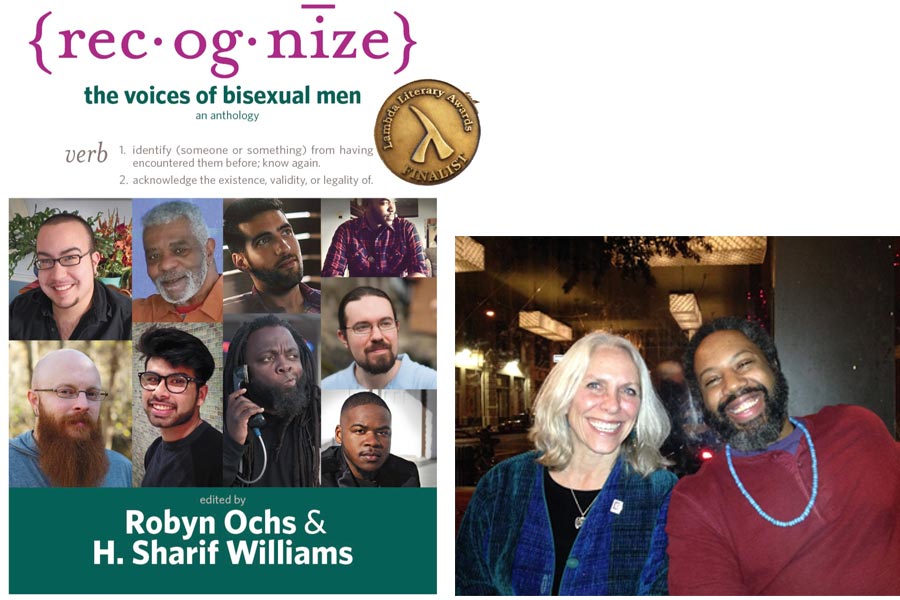The understanding of bisexuality has recently been enriched, thanks to a new anthology called “Recognize: The Voices of Bisexual Men.”
“Recognize” includes essays, photographs, poetry and short stories by more than 60 bisexual men. The book, which runs just over 300 pages, is divided into 10 sections addressing broad categories like identity, institutions and relationships. It was coedited by Robyn Ochs and H. Sharif Williams, two well-known bisexual activists.
According to Williams, who is also known among bisexual activists and researchers as Dr. Herukhuti, “Recognize” is the first English-language anthology of writing and visual art by bisexual men. But the book’s importance goes far beyond its novelty.
“For bisexual men, it is an affirmation of our diversity, across ethnicity, across age, across nationality, across class,” Williams said. “It is also a mirror. It’s a way of looking at ourselves and seeing what we share that is common among us.”
Of course, “Recognize” wasn’t intended solely for bisexual men. The book’s coeditors hope that other members of the LGBT community also will find it informative and inspirational.
“For others in the LGBT community, it is a resource to help people dismantle the myths that they may have and the prejudices they may have about what it means to be bisexual and male,” Williams said.
“Recognize” challenges those long-held misunderstandings by presenting the experience of bisexual men in all its complexity. The contributors range in age from their 20s through their 70s, they come from all racial and ethnic backgrounds and they include both cisgender and transgender bisexual men. Some are currently involved in same-sex relationships; others, in opposite-sex relationships.
According to Williams, representing such a wide variety of perspectives on male bisexuality was an intentional editorial strategy.
“One of the things that we know, as bisexual people, is that power and strength comes in diversity, and that one of the hallmarks of bisexual spaces is that that diversity and mixing of fluidities will exist, can exist, to help to promote the flourishing of community,” he said.
In addition to presenting a broad spectrum of the male bisexual experience, “Recognize” is also notable for welcoming new voices to the discussion. Alongside pieces by established activists and authors like William Burleson, Ibrahim Farajajé and Ron Suresha, readers will encounter many first-time authors.
Getting that opportunity is a significant improvement over what bisexual men, and those who work with them, found in the past. In one of two contributions to “Recognize,” Dr. Brian Dodge, an associate professor in the Indiana University School of Public Health-Bloomington, recounts some of the ignorance and misunderstanding he encountered when he tried to begin his career as a sexual-health researcher studying bisexual men. Some progress has been made since then, he noted.
“I hope that the next generation of bisexual health researchers will be able to answer those bigger questions without ever having to justify why bisexuality matters or to prove that bisexual men exist,” Dr. Dodge wrote via email.
“Believe it or not, I have dealt with those kinds of comments from grant reviewers, colleagues, and people in positions of power and authority.”
“Recognize” may help rectify that situation. Prior to the book’s publication, Williams explained, there were resources available in print for bisexual women, including “Bi Women Quarterly,” edited by his colleague, Robyn Ochs.
At her numerous public lectures, Ochs was often asked if any corresponding resources existed specifically for bisexual men — a question she got so often that she considered running a special issue of “Bi Women Quarterly” for men.
Williams reached out to Ochs in the early stages of that project and, working in collaboration, their plans for a resource devoted exclusively to bisexual men evolved far beyond what they had originally imagined.
One of the reasons they were able to expand the project into a book was the overwhelming response they got from bisexual men. Some community members submitted their writing and artwork; others volunteered to help with editing.
“When we put out the call, we got a tremendous amount of response and feedback and people volunteering their time to proofread and copyedit,” Williams said.
So far, reaction to the anthology has been overwhelmingly positive. “Recognize” has been nominated for a Lambda Literary Award and is a finalist in three different categories for the upcoming Bisexual Book Awards.
Those accolades are welcome, but even more pleasing to Ochs and Williams is the feedback they’re getting from ordinary bisexual men.
“People are recognizing themselves in the pages and doing so for the first time, and using it as an opportunity to reach out and to engage and find others whom they recognize as their brothers, and I think that that’s a powerful, powerful experience,” Williams said.
For more information about “Recognize,” visit the website of its publisher, the Bisexual Resource Center: www.biresource.net.
